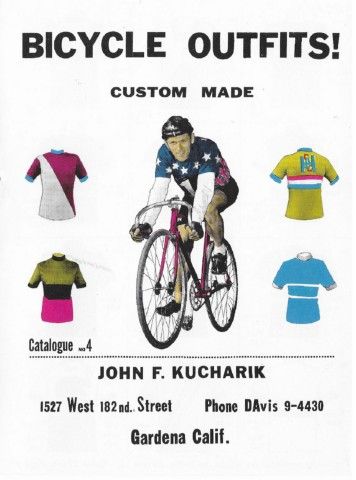GARDENA, Calif. (BRAIN) — After 50 years of selling and preaching the benefits of wool cycling clothing, John Kucharik Jr. is leaving the industry.
Kucharik Bicycle Clothing will close on Thursday, 88 years after his dad, John Kucharik Sr., began the business. Kucharik Sr. died in 2008 at age 93.
"I'm going to turn 69 pretty soon," Kucharik Jr. told BRAIN on Tuesday, while adding his sales have escalated since the pandemic began two years ago. "It's really sad because I have a lot of customers. This is really sad on both parts. But I've been promising my wife to travel and to do some stuff."
While the showroom and factory at 1745 W. 182nd St. in Gardena will shut its doors after Thursday, Kucharik will continue to sell off inventory online until it's depleted. Kucharik sold the building, which he has considered a home away from home for 42 years. The new owner will rent the space out, he said.
While known as one of the few manufacturers that produce wool cycling clothing, Kucharik also became one of the few that repaired all fabrics of cycling clothing.
"I don't make my money on repairs," he said. "I just do it because I do it. My dad did it; I did it. I do zippers. I do pads and stuff. You have the top-notch suppliers, these guys pay $200, $250, $300 for a bib short. They ride it once and they can't ride it again. A bike shop doesn't want it back, so I average probably about 40 shorts — not mine — and bibs and tights a week with pad replacements because what are you going to do? Throw it in a corner and look at it?"
Back in the day, when first tagging along with his dad as "the punk kid that I was," Kucharik said he would argue with him that lycra and synthetic fabrics would overtake wool. That never happened at Kucharik Bicycle Clothing, but interestingly, the younger Kucharik admitted he didn't convert to wool until about five years ago.
"I preached it because I sold it, and I could sell a good story," he said. "I'm older now. I started wearing wool jerseys, baseliners, and I've been riding with these two guys for 30 years. And my other two buddies refused to wear this because wool doesn't have the pizzaz, doesn't have the print, doesn't have the bright colors like the printed jerseys. But it doesn't matter if it's 40 degrees or 80 degrees. You're stone dry underneath because it's a natural fiber that breathes. It keeps you warm; it keeps you cool. And you can tell people in California 24/7 that, and they think you're on drugs. Never hot, never cold."
A natural story-teller and industry name-dropper, Kucharik said one of the things he'll miss most is gabbing with his loyal customers about the olden days.
"Most of these customers are friends of mine. I'm a gatherer. I like to talk. Back in the day, when my dad introduced me (to the industry), I remember the first trade show, and it was in San Diego in the bottom of the Sheraton Hotel. I was like 16-years-old, standing in grease where the cars parked, and I looked at my dad and said, 'You call this an industry? And you want me to come work here for you?' There were like 30 vendors there: Schwinn, Peugeot, Bob Hansing with Euro-Asia Imports, us, and a few other vendors. I met Mr. Shimano through people. I met Mr. Campagnolo. There is a Mr. SunTour. And all of these people I met. My customers like hearing these stories because they don't see this. I've seen the industry grow from its infancy up and down. Howie Cohen from Kuwahara, who developed Nishiki, we used to have dinner with him."
Saying goodbye to the seven employees who have been with him the past 30 years will be difficult, he said. "We haven't hired in 30 years because that's my family. I don't need a production person. I don't need this or that. It's funny. I tell people: They don't work for me; I work for them. They know what to do. And that's what's so nice about all of this. I can't make money without them."
The emotion of officially saying goodbye will flood Kucharik on Friday, he said, when he hands over the keys to the building.
"I'll come in here, I'll meet the guy (the buyer of the building), and I'll give him the keys, and I'll probably cry," Kucharik said. "I was getting emotional just thinking about coming in here this morning (Tuesday). I've been coming to work at this location for almost 40-something years. Every day, get up at 5:30 and come in here and prepare. My dad did the same thing. It's kind of a little sanctuary here, and I understand that when I was younger, my buddies would say, 'Man, doesn't your dad stay home with your mom? I mean, even after church on Sunday we see the car there.'
"Same thing with me."


